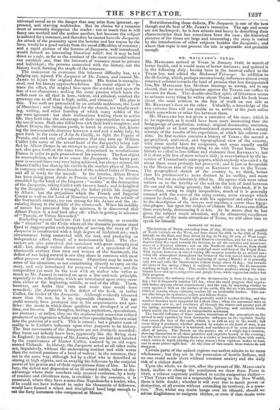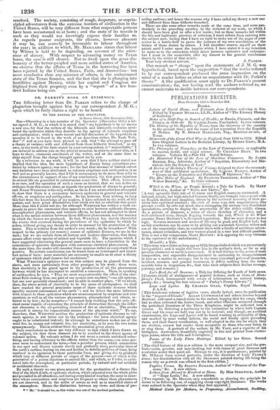ME. MAIL LARD ' S TEXAS. 4 MR. MA ILLARD arrived at
Texas in January 1840, in search of better health, and it would seem of better fortunes ; and quitted it in the following July ; having been in the interval called to the Texan bar, and edited the Richmond Telescope. In addition to the ill-feeling, which, perhaps unconsciously, influences almost every returned colonist towards the land of promise that has disappointed him, Mr. MAILLARD has Mexican leanings so strong, not to say absurd, that no mere indignation against the Texans can suffice to account for them. This double-distilled spirit of bitterness seems to animate every thing he writes about Texas ; and his book bears about the same relation to the line of truth on one side as Mr. KENNEDY'S does on the other. Unluckily, a knowledge of the two extreme lines will not enable us to arrive at the juste milieu which somewhere or other lies between them.
Mr. Maim.aan has not given a narrative of his tour ; which is to be regretted, as it would have been more interesting than the hodgepodge of compilation, extract, original documents, statistics, apocryphal or at least unauthenticated statements, with a scanty mixture of the results of his experience, of which his volume con- sists. Its first section contains a history of Texas ; the second a geographical, statistical, and topographical view of the country, with some useful hints for emigrants, and some equally useful warnings against having any thing to do with Texan loans. The history so called is less diffuse and elaborate than KENNEDY'S; but it is done with less of mere writer's skill ; is overwhelmed by the in- sertion of Transatlantic state-papers, which anybody who cared a fig about them most probably has procured ; and is just as favourable to the Mexican side of the story as KENNEDY was to the Texan. The geographical sketch of the country is, we think, better than his predecessors; more distinct in its outline, and more clearly but not so elaborately filled in. He agrees with most other writers as to the fertility of the soil on the belt of land between the sea and the rising ground ; but adds this drawback, if it be true—that, owing to slight inequalities, much of it is generally covered with the water of the rainy season, mere swamps which cannot be drained. He joins with his opponent and other writers in the description of the insects and reptiles, a worse than Egyp- tian plague : but upon the subject of climate Mr. Manmean differs from everybody, denouncing it in toto. As he states that he has given the subject much attention, and its climaterial excellence formed one of the main attractions of Texas, we will allow him to speak for himself.
CLIMATE OF TEXAS.
The territory of Texas, extending from 27 deg. 30 min. to the 42d parallel of North latitude on the West, and from about the 29th to the 34th of North latitude on the East, and from about 94 deg. to 94 deg. 30 min. of West longi- tude, is exposed on the Southern and Eastern extremities, and for two or three degrees from the coast towards the interior, to all the varieties and inconveni- ences of a Tropical climate; and on the Northern and Western, from about the 35th of North latitude, to the perpetual snow and frost of the Frigid Zone. This region, however, is visited during the summer months by an ardent sun ; while the atmosphere throughout the former of the last-named limits is either very wet, cold, or sultry. At the beginning of spring (March) it is generally very wet and cold, the thermometer seldom rising above 45 deg.; but towards the close of the spring (May) it suddenly becomes sultry, the thermometer reaching as high as 95 deg. This sudden transition produces among the inha- bitants fever and ague, congestive and jungle fever, while vegetation snakes but little progress.
In summer, the ordinary range of the thermometer is from 95 deg. to 105 deg.; but it frequently touches 125 deg., when the rapid progress that vegeta- tion makes appears almost supernatural; and the sun, by imparting vitality to every species of filth on the surface of the earth, fills the air with innumerable tribes of insects, whose existence renders life an intolerable burden. This sea- son also brings its epidemics, yellow and bilious fevers. In autumn, the thermometer falls gradually until it reaches 60 deg., and the weather becomes more congenial for a short time; when the autumnal rains or rainy season sets in, and continues all through the winter and greater part of the spring, accompanied by awful thunder, lightning, and northerly winds, which search the frame with an indescribable acuteness.
The baneful influence of these sudden transitions of the atmosphere on the animal is only equalled by their destructive influence on the vegetable family that covers the face of the earth, which is as rich as any in the world ; but every thing it produces, whether planted by nature or the hand of man, is no sooner above ground than it is matured, and vanishes as if by some convulsive effort of nature. The flowers on the prairies are of a single day's creation, showing themselves in all their primitive and exquisite beauty in the evening; but the next day's sun reduces them to a cinder or inundates them with water, which varies in depth (during the rainy season) from eighteen inches to four, and in some places eight feet. At the close of this season these waters do not disappear.
Certain parts of the upland regions our author admits to be more wholesome ; but they are in the possession of hostile Indians, and no one could settle there without constant anxiety and the daily risk of a violent death.
Upon the whole, we do not, after the perusal of Mr. MAILLARD'S book, incline to change the conclusion we drew from Texas in 1840, a volume expressly published to excite emigration thither- " That Texas will rise to a respectable footing in the New World, there is little doubt ; whether it will ever rise to much power or distinction, at all events without extending its territory, is a ques- tion." Nor, whilst any doubt hangs over its climate, should we advise Englishmen to emigrate thither, or even if that doubt were
resolved. The society, consisting of rough, desperate, or unprin- cipled adventurers from the extreme borders of civilization in the United States, will be very different from what respectable persons have been accustomed to at home ; and the state of its morale is such as they would not knowingly expose their families to. As regards poorer emigrants, the climate, however pleasant it may be, can scarcely be favourable to labour throughout the year; in addition to which, Mr. MAILLaan states that labour by Whites is held to be degrading, on account of the exist- ence of slavery. With respect to advancing money on Texan loans, the case is still clearer. Not to dwell upon the gross dis- honesty of the better-peopled and more settled states of America, we observe that the efforts of Texas in the borrowing line have, been rejected by the United States, Paris, and Amsterdam : but more conclusive than any mistrust of others, is the embarrassed state of the Texan finances, and the fact that she is plunging into hostilities against Mexico, while her capital and Congress are frighted from their propriety even by a "report" of a few hun- dred Indians being out.























 Previous page
Previous page